八下英语Unit7第一课时课件
人教版八年级下册第七单元英语课件.ppt
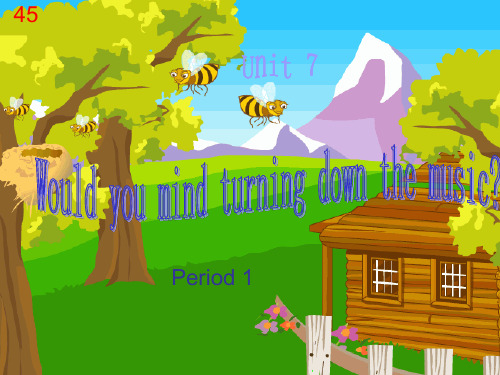
Eg:would you mind not smoking here? 3.请你不要讲话好吗? Eg:would you mind not talking?
• Would you mind doing sth?=
• Would you mind +名词宾格/形容词性物主代词+doing sth?你介意某人做某事吗?
Sorry,I have to sleep.
sweeping the floor
Would you mind sweeping the floor?
Certainly not. Sorry,you’d better not.
turning off the light
Would you mind turning off the light ?
Turn on 打开
it up.
Turn on the TV .
Turn off 关闭
Turn off the TV.
Grammar
Right away立即,马上。多用于一般将来时。 at once =in a minute=in a moment =right
now
Eg:我的朋友马上就会回来。 My friend will come back in a minute/moment.
No problem. Sorry,I have to read books.
Not closing the window
Would you mind not closing the window? .
I am sorry,I won’t do it again.
not playing basketball here
Uni7 Section A 1a-2d课件 人教版八年级英语下册
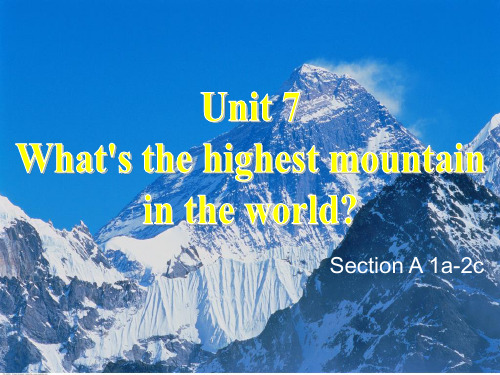
800
650
520,000
2
Question time:
36,500, 435, 478. 23 ↓ ↓ ↓ ↓
billion十亿)
million百万
thousand 千
Can you read these numbers? 8,844.43 6,671 1,025 9,600,000
Fill in the blanks.1.这张桌子两米长,一米宽。 and ___________________2.这座山有1500米高。3.这栋楼120米高。4.这本字典有五厘米厚。5.这个湖有多深? 125米深。
The table is __________________
Notes
1. as +原级+ as 和...一样.... 2. 比较级+than 比...更3. the 最高级 of..../in .... “...中最....” the second/third 最高级adj. +n. 第几...的... one of 限定词 +最高级adj. +n(pl.) 最...之一 4. much/a lot/far/a little/a bit/even/still + 比较级5. This hole is not as/so deep as that one. 不如...=>This hole is less deep than that one.=>That hole is deeper than this hole.6. The Nile is the longest river in the world. =>The Nile is longer than any other river in the world. the other rivers
八年级英语下Unit7 section A 1a-1c课件

Would you mind making the bed?
Ok. I‘ll do it right away.
Would you mind… ?
Would you mind… ?
Would you mind… ?
Would you mind… ?
课堂训练1a 1b
Match the requests with the things in the picture above. Write the letter [a---d] in the correct boxes above. Listen and number the requests above in the order you hear them.
Now, Would you mind taking a rest and relaxing ?
See you later !
婉地向别人提出请求、建议 等.mind后接动名词形式.
2.常用答语为: No, not at all. No, I’ll do it right away. Of course not. Sorry, I’ll do it right away.
Task:
Imagine you need your classmates to help you at school .Who would you like to ask for help and what will they respond to you ?Please make a survey and complete the chart below.
unit7
Could you please give me your pen? Please lend your exercise book to me.
八年级英语下册unit7课件(一)

八年级英语下册unit7课件(一)Unit 7: The WeatherTeaching Content•Vocabulary related to weather•Sentence structures for describing weather•Listening and speaking activities related to weather •Reading and writing activities related to weather Teaching Preparation•Prepare flashcards or visual aids for weather vocabulary •Prepare listening materials or videos related to weather •Prepare reading materials or texts related to weather •Prepare writing activities or prompts related to weather Teaching Objectives1.To introduce and practice weather vocabulary2.To provide opportunities for students to practicedescribing weather using appropriate sentence structures3.To improve students’ listening and speaking skillsthrough weather-related activities4.To enhance students’ reading comprehension skillsthrough weather-related texts5.To develop students’ writing skills by engaging them inweather-related writing tasksDesign ExplanationThe design of this lesson aims to engage students in various activities related to weather, allowing them to actively practice and consolidate their understanding of the vocabulary and sentence structures. The lesson includes a combination of listening, speaking, reading, and writing activities to cater to different learning preferences and skills.Teaching Process1.Warm-up activity:–Show pictures of different weather conditions and ask students to describe them using the appropriatevocabulary.–Play a short video or audio clip of different weather conditions and ask students to identifythem.2.Vocabulary introduction and practice:–Present weather vocabulary using flashcards or visual aids.–Drill the pronunciation and spelling of the weather words.–Engage students in various vocabulary practice activities such as matching, fill in the blanks, orword association games.3.Sentence structure practice:–Introduce sentence structures for describingweather (e.g., “It’s sunny today,” “It’sraining heavily”).–Provide examples and model the sentence structures.–Ask students to practice forming sentences to describe different weather conditions.4.Listening and speaking activities:–Play a weather-related listening activity or video.–Ask comprehension questions to check understanding.–Engage students in speaking activities such as pair or group discussions about their favorite weatheror their experiences in different weatherconditions.5.Reading activity:–Provide students with a short passage or text about different weather conditions.–Ask students to read the text and answercomprehension questions.–Discuss the main points and key details in the text.6.Writing activity:–Assign a writing task related to weather, such as writing a weather forecast or describing amemorable weather experience.–Provide prompts or guiding questions to helpstudents structure their writing.–Collect and review students’ written work,providing feedback and suggestions for improvement.Post-lesson ReflectionThis lesson successfully engaged students in various interactive activities related to weather. The use of visual aids, listening materials, reading texts, and writing tasks provided students with different opportunities to practice and apply their understanding of weather vocabulary and sentence structures. The lesson could be further improved by incorporating more group activities and opportunities for student interaction. Additionally, providing students with real-life weather scenarios or dialogues could make the lesson more practical and relatable.Unit 7: The Weather (Continued)Teaching Content•Vocabulary related to weather•Sentence structures for describing weather•Listening and speaking activities related to weather •Reading and writing activities related to weather Teaching Preparation•Review flashcards or visual aids for weather vocabulary•Prepare additional listening materials or videos related to weather•Find more reading materials or texts related to weather •Prepare more writing activities or prompts related to weatherTeaching Objectives1.To reinforce weather vocabulary and sentence structures2.To provide extended opportunities for students topractice describing weather in speaking and writingactivities3.To further improve students’ listening and speakingskills through weather-related activities4.To deepen students’ reading comprehension skillsthrough additional weather-related texts5.To expand students’ writing skills by engaging them inmore challenging weather-related writing tasksDesign ExplanationContinuing from the previous lesson, this lesson builds upon the students’ existing knowledge of weather vocabulary and sentence structures. The focus of this lesson is toprovide additional practice and extension activities to further develop their proficiency in describing weather. The lesson includes more listening, speaking, reading, and writing activities to reinforce their understanding and skills.Teaching Process1.Warm-up activity:–Review the weather vocabulary by playing aflashcard game or a quick vocabulary quiz.–Ask students to describe the weather conditions outside the classroom at that moment.2.Vocabulary and sentence structure reinforcement:–Review the sentence structures for describing weather.–Provide additional examples and ask students to create their own sentences using different weathervocabulary.3.Listening and speaking activities:–Play a weather-related dialogue or conversation.–Ask comprehension questions and engage students in discussions about the dialogue.–Arrange pair or group activities where students role-play different weather scenarios.4.Reading activity:–Provide students with an extended reading passage about weather phenomena or climate change.–Ask students to read the text and answer more in-depth comprehension questions.–Encourage students to share and discuss their opinions on the topic.5.Writing activity:–Assign a more advanced writing task related to weather, such as writing a persuasive essay on theimpact of weather on daily life.–Provide prompts and encourage students to conduct research or gather information to support theirarguments.–Provide feedback on students’ writing and guide them in improving their critical thinking andpersuasive writing skills.Post-lesson ReflectionBuilding upon the previous lesson, this lesson successfully reinforced students’ understanding of weather vocabulary and sentence structures. The additional listening, speaking, reading, and writing activities provided opportunities for students to apply these language skills in various contexts. Students were able to engage in more in-depth discussions and express their opinions on weather-related topics. To further enhance the lesson in the future, incorporating real-life weather data, multimedia resources, or interactive online platforms relating to weather could make the learning experience more dynamic and captivating.。
仁爱英语八年级下册 Unit7 Topic1 Section A 课件

与某人在网上联系 获得更多有关…... 的信息 考虑
Key Sentences
1) I know he wants to build a new school for his poor village in Nigeria.
2) I think money must be a problem for him.
Kangkang: Good! I’ll get in touch with Daniel on the Internet to get more information about him.
Jane:
Maria:
I will think about how to organize the food festival.
Jane:
Do you know about Daniel Igali?
Kangkang: Yes. He is the first Canadian Olympic wrestling champion. Michael : But he was born in Nigeria. Maria: Jane: Yes. And I know he wants to build a new school for his poor village in Nigeria. He is very kind. But I think money must be a problem for him.
1b
Work alone
Read 1a again and match.
Jane says (that) Kangkang knows (that) Michael thinks (that) Maria says (that)
新目标英语八年级下Unit 7 第一课时PPT优选课件
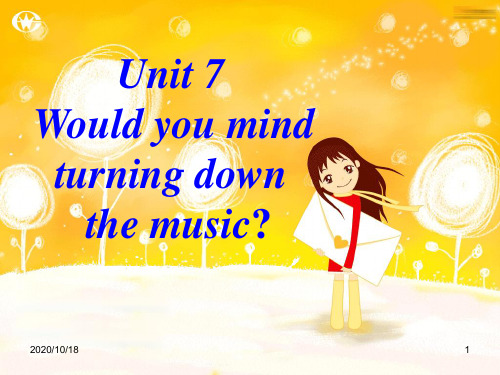
2020/10/18
20
Would you mind … ?
Turning down the music Moving your bike
2020/10/18
Cleaning the yard
21
Not playing baseball here?
想象现实生活中的一些场景,用上 would you mind … 并展现给大家!
A:Would you mind … ? B:Not at all . I’ll ….
2020/10/18
22
2a Listening
_5_ a. Sarah, would you mind doing the dishes?
_2_ b. Nick, would you mind not
wearing those old jeans?
doing the laundry
2020/10/18
12
Would you mind …
doing the dishes
2020/10/18
13
Would you mind …
taking out the trash
2020/10/18
14
Would you mind sweeping the floor ?
2020/10/18
6
Would you mind not playing basketball here?
Sorry. We’ll go and play in the park.
2020/10/18
7
Would you mind moving your car? No, not at all.
新目标英语八年级下unit7课件(全)[1]
![新目标英语八年级下unit7课件(全)[1]](https://img.taocdn.com/s3/m/0a356c116bd97f192279e942.png)
open the window do the dishes make the bed …….
weep the floor do the laundry clean the living room
礼貌地提出请求
You also can say ”Would you mind …?” to ask for help.
• Would you mind doing…?你介意做….吗? • Would you mind (not) doing…?你介意(不)
做….吗? 注意以上两个问句的答语: • 1)表示不介意:
• No, not at all. /Sorry, I’ll do it right away. • Certainly not./Sorry,Iwon’t do it again. …..
Would you mind not…?
sleeping late playing baseball in a yard playing the computer games using mobile phone in class ….. talking in class Taking photos copying homework arriving late for school
Welcome to Unit 7
Unit 7
Would you mind turning down the music?
Section A 1a-1c
What did you do last night? --When I was listening to the music, I fell asleep last night.
1a: match the requests with the pictures
仁爱版八年级英语下册课件 Unit 7 Topic 1 Section A授课课件

5. Kangkang: Good! I’ll get in touch with Craig Kielburger on the Internet to get more information about him. 好!我将从网上与克雷格·柯伯格联系,了解 更多关于他的信息。
get in touch with 与……联系;和……接触 e.g. You can get in touch with the school by telephone or by e-mail. 你可以通过电话或电子邮件与学校取得联系。
Summary
We learn:
1. Some words: task, poster, touch, success, imagine, soup, cheese, cookie, pancake, set, blind
2. Some phrases: know about, raise money, food festival, turn to, make a poster, get in touch with, try one’s best, set the table
We can:
Make sentences with that guide the object clauses.
Exercise
一、选择填空
1. Jane: Do you know about Craig Kielburger? 你知道克雷格·基尔伯格吗?
know about了解,知道……的情况 e.g. He wants to know about Chinese culture. 他想了解中国文化。 know v. 知道,认识 e.g. I know her. She is our monitor. 我认识她。她是我们的班长。
新目标英语八年级下Unit7 第一课时PPT课件

Would you mind …
folding the clothes
Would you mind …
making the b
doing the laundry
Would you mind …
doing the dishes
Would you mind …
Don’t play football on the road, please
Would you mind not playing football on the road?
Would you mind cleaning your room?
I’m sorry. I’ll do it right away.
1a Match the requests with the people in the picture.
a c
d
b
1b listening
__ 2 a. Would you mind cleaning the yard?
__ 4 b. Would you mind not playing
baseball here? __ 3 c. Would you mind moving your bike? __ 1 d. Would you mind turning down the music?
Would you mind … ?
Turning down the music
Moving your bike
Clean ing the yard
Not play ing baseball here?
想象现实生活中的一些场景,用上 would you mind … 并展现给大家! A:Would you mind … ? B:Not at all . I’ll ….
八年级英语下册Unit7_section_A(第一课时)课件人教版

4
would you mind not wearing those old jeans?
2
would you mind getting out of the bathroom?
3
1 ___Pete, would you mind getting up?
2b Listening 1. ____ Sorry. I won’t be long.
a. b. c. d.
2 Would you mind cleaning the yard?______ 4 Would you mind not playing baseball here?___ 3 Would you mind not moving you bike?_____ 1 Would you mind turning down the music?___
Welcome to Unit 7
Would you mind turning down the music?
Lead-in
I think it is a little bit hot in our classroom and I want to ask someone to open the window .What can I say ?
Listen and number the pictures in the order you hear them.[1-5]
___Jenny,
___Sarah,
would you mind doing the dishes?
___Nick,
5
would you mind cleaning your room?
Turn up
Unit7第1课时SectionA八年级英语下册精品课件(人教版)
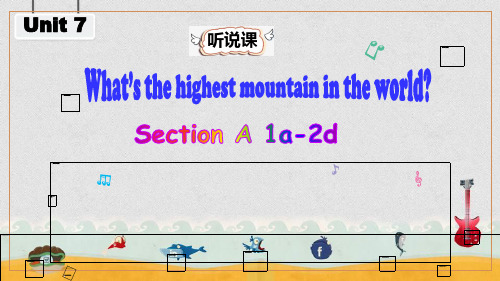
How deep is the Caspian Sea ? It’s 1,025 meters deep.
It is the d_e_e_p_e_s_t_ salt lake in the world. =It is the deepest of all the salt lakes in the world.
We live in a fantastic world. In the world, we have many high mountains. And we have big rivers, seas, and _d_e_s_e_r_ts_as well.
The Sahara, about 9,600,000 square kilometers in size
deep adj. 深的
e.g. The well is about 6 meters deep.
Background information
the Sahara
This desert lies in the northern part of Africa. The weather condition is really bad.
/'æ məzən/
Which country has the biggest population in the world? A. America ﹥315,000,000 B. China ﹥1,350,000,000
C. India
D. Japan
1a Match the facts you know.
Background information the Nile
The river runs through the north-western area of Africa and then into the Mediterranean Sea(地中海). It is the longest river in the world.What river is it?
八年级下册英语unit 7课件(一)
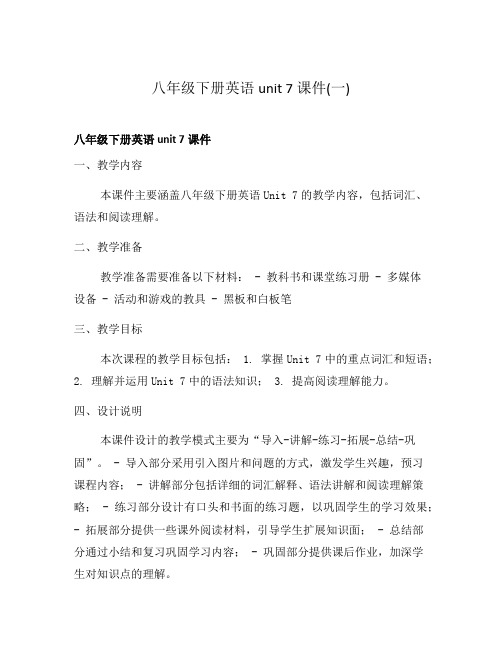
八年级下册英语unit 7课件(一)八年级下册英语unit 7课件一、教学内容本课件主要涵盖八年级下册英语Unit 7的教学内容,包括词汇、语法和阅读理解。
二、教学准备教学准备需要准备以下材料: - 教科书和课堂练习册 - 多媒体设备 - 活动和游戏的教具 - 黑板和白板笔三、教学目标本次课程的教学目标包括: 1. 掌握Unit 7中的重点词汇和短语;2. 理解并运用Unit 7中的语法知识;3. 提高阅读理解能力。
四、设计说明本课件设计的教学模式主要为“导入-讲解-练习-拓展-总结-巩固”。
- 导入部分采用引入图片和问题的方式,激发学生兴趣,预习课程内容; - 讲解部分包括详细的词汇解释、语法讲解和阅读理解策略; - 练习部分设计有口头和书面的练习题,以巩固学生的学习效果;- 拓展部分提供一些课外阅读材料,引导学生扩展知识面; - 总结部分通过小结和复习巩固学习内容; - 巩固部分提供课后作业,加深学生对知识点的理解。
五、教学过程1.导入•引入一张关于旅行的图片,并让学生描述图片内容;•提问:“你最向往去哪里旅行?为什么?”激发学生思考和讨论。
2.讲解•介绍Unit 7的主要词汇和短语,解释其意思和用法;•解释Unit 7的语法知识,例如宾语从句和宾语从句的引导词;•分析并讲解阅读理解文本,指导学生如何解读文本内容。
3.练习•利用教材中的练习题,让学生运用所学的词汇、短语和语法知识进行口头练习;•分发练习册并完成相关的书面练习题。
4.拓展•提供一些相关的课外阅读材料,让学生自主阅读并回答问题;•引导学生讨论自己的旅行经历或梦想。
5.总结•小结本节课教学内容,重点回顾重要知识点和难点。
6.巩固•布置课后作业,包括词汇搭配练习和写一篇关于梦想旅行的短文。
六、课后反思本节课的教学过程较为顺利,学生积极参与讨论和练习。
但在语法部分的讲解中,有个别学生存在理解困难,需要进一步加强解释和操练。
同时,在阅读理解部分,学生的阅读能力还需要进一步提高。
英语人教版八年级下册Unit 7 PPT课件(第一课时)

Homework
Write an article about Qomolangma You can find the information from page 51 in your book .
Thank you!
It’s nice to study English with you cute and lovely students.Thank you very much, goodbye.
Pay attention
英语数字有个、百、千、百万、十亿、万亿等单位构成,千位数 以上,从数字的右端向左端数起,每三位数加一个逗号“,”. 从右开始,第一个“,”前的数字后添加 thousand,第二个“,”前面 的数字后添加 million,第三个“,”前的数字后添加 billion.然后 一节一节分别表示,两个逗号之间最大的数为百位数形式. 例如一个大数字:333,333,333读作:three hundred and thirty three million, three hundred and thirty three thousand, three hundred and thirty three. 读带小数点的数字时,小数点前面的基数词和前面讲的基数词的 读法相同;小数点后的数字则必须一一读出, 如:23.0089读作:twenty three point zero zero eight nine
Unit 7
What’s the highest mountain in the world?
Wushengyizhen Middle school Wang Aizhong
Do you know what are they?
人教版八年级英语下册unit7第一课时课件

the salt lakes. 4. The Nile is _th_e__lo_n__g_es_triver in the world.
Task 3
1c Use the information in 1b to make conversations.
A: What’s the highest mountain in the world?
B: Qomolangma
SUMMARY
A: To memorize the important phrases and sentences.
B: To make some dialogues about asking the size of objects.
The Nile
8,844.43 meters high
Task 2
1b Listen and complete the sentences. 1. Qomolangma is _h_ig_h_e_r_ than any other
mountain in the world. 2. The Sahara is __th_e__b_i_g_g_es_t__ desert in
square n. 平方
meter n. 米
deep adj. 深的
desert n. 沙漠
population n. 人口
Asia n. 亚洲
tour v. n. 旅行
tourist n. 旅行者
wall n. 墙
amazing adj. 令人大为惊奇的
ancient adj. 古代的
人教版八年级英语下册Unit 7 第一课时(1a-2d)课件(26张PPT)

2b.Listen again and fill in the blanks in 2a with the numbers in the box.
2. The Sahara is __t_h_e_b_i_g_g_e_s_t _ desert in the world.
3. The Caspian Sea is __th_e__d_e_e_p_e_st__ of all the salt lakes.
4. The Nile is t_h_e__lo_n_g_e_s_t river in the world.
8,844.43 meters high
1a
Practice in pairs like this: A: Which is the … in the …? B: …
1b. Listen and complete the sentences.
1. Qomolangma is h__ig_h_e_r_ than any other mountain in the world.
It’s a lot bigger than the population of the US.
_1__ China is over ___ years old. It has a much longer
history than the US. The US is not even ___ years old.
What's the highest mountain
Unit 7
in the world?
- 1、下载文档前请自行甄别文档内容的完整性,平台不提供额外的编辑、内容补充、找答案等附加服务。
- 2、"仅部分预览"的文档,不可在线预览部分如存在完整性等问题,可反馈申请退款(可完整预览的文档不适用该条件!)。
- 3、如文档侵犯您的权益,请联系客服反馈,我们会尽快为您处理(人工客服工作时间:9:00-18:30)。
questions.
2_s_. cW_Si_he_een_cg_keo_n.t SgohoweodwhgaorsawadlessPoianula2__.h_Sp_ahia_esn_so_ct_il_hl_pa_lnafyrgosemthde.
1. Mario used to be _sh__o_rt_. He used to wear _g_la_s_s_e_s.
2. Amy used to be _t_a_l_l . She used to have _s_h_o_r_t__ hair.
3. Tina used to have _r_e_d_ and _c_u_r_ly__ hair.
Super English class
1.Be active! 2.Follow directions! 3.Team work! 4.Try our best!
(积极主动) (听从指令) (团队协作) (全力以赴)
Unit 7 I used to be afraid of the dark.
Section A (1a-2d)
Listening tip 1: Predict(预测)
听Ca前n,y根o据u图d片e或sc题r目ib对e材(描料述内容) B做o出b粗’s略f的ri猜e测nd和s推?断。
Mario
Amy
Tina
I’m Bob.
L1isbteLniisntegntiapg1a:inP.rWedhicatt(预di测d)Bob’s friends 听u前s,e 根to据l图oo片k或l题ik目e对?材料内容做出粗略的猜测和推断。
humorous
Task 2
Say something about our personality(性格)
Have a look (看一看) “考考你的眼力”
You used to be …, didn’t you? … used to be/do …, didn’t he/she?
Have a talk (说一说)
Have a guess (猜一猜)
-HDeiduysoeudutsoebtoe bh_ee_a_hv_eay_v. y?
- Yes, I did. / No, I didn’t. - Did he use to be heavy? - Yes, he did. / No, he didn’t.
Have a talk (说一说)
A: You used to be …, didn’t you? B: Yes, I did. / No, I didn’t. A: … used to be …, didn’t he/she? C: Yes, he/she did. / No, he/she didn’t.
You can describe(描述) yourself and your classmates.
In the past
Now
1.Paula used to be really 1. Now she’s more __q_u_i_e_t__. She was always interested in _s_p_o__rt_s__. silent in class. She wasn’t She plays s_o__c_c_e_r ____ very __o_u_tg__o_in_g__. She was almost every day. She’s neቤተ መጻሕፍቲ ባይዱer brave enough to ask also on a _s_w_i_m___ team.
Learning Aims教学目标
1
To use “used to
2
To talk about “changes” and learn
3
Share more and change
Learning Aims教学目标
2
1
To talk
3
about
To use
“changes” To share
“used to
Your faces have changed a lot in the past 10 years. So do I.
Have a talk (说一说)
2007
2020
Hacvuerylyouhachiranged your psetrrsaoingahltithy(a性ir 格) ?
serious
A: Did you use to be …? B: Yes, I did. A: Did you use to have … hair ? B: No, I didn’t. C: Did he/she use to be …? D: Yes, he/she did. C: Did he/she use to have … hair ? D: No, he/she didn’t.
Task 1
Say something about our appearance(外貌)
HaveWahoguisessshe(猜? 一猜)
曾经
I wusaesdatostbuedeanst,tudent, but now I’m a teacher. I used to be short. I used to have long hair.
and learn
more and
bIfe/ydoou”try youlrisbteesntinagnd chancgheabnegteter,
如c正“o果确urs你r使eeyd尽c用ott全uloy”.力wi变ll得st变u更ipc,好sc掌.e,谈e握你d论技将i改n巧会t.h获e得f成ub学极te功会 向uttr的分 上eer.果享 !! 实,。积
Listening tip 1: Predict(预测)
听前,根据图片或题目对材料内容做出粗略的猜测和推断。
2bL听i前sLPt,aiesu根tnleai据nnh图材gaag片料tsai或内cpinh题容12aa目标:nnPkg对出deer材能cdeyo.料帮dmwi内助cpot容你lr(ed预做获tes出取测(t关h粗信)e键略息c的词ha猜词)r.测汇t a和。b推o断ut。how
